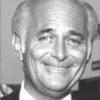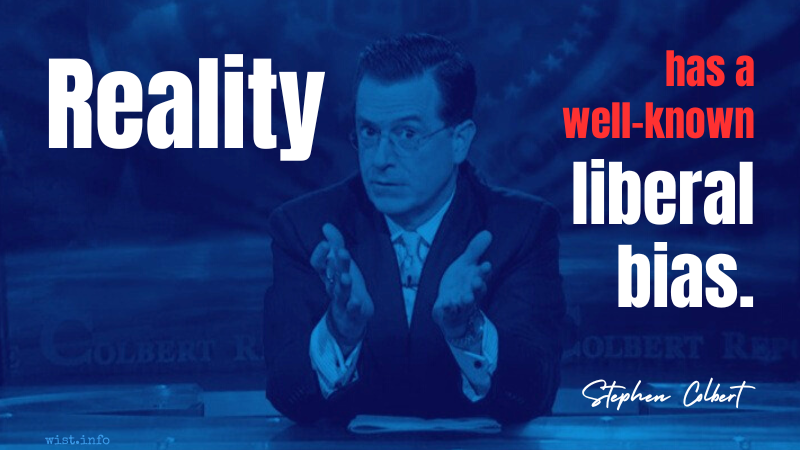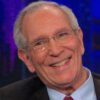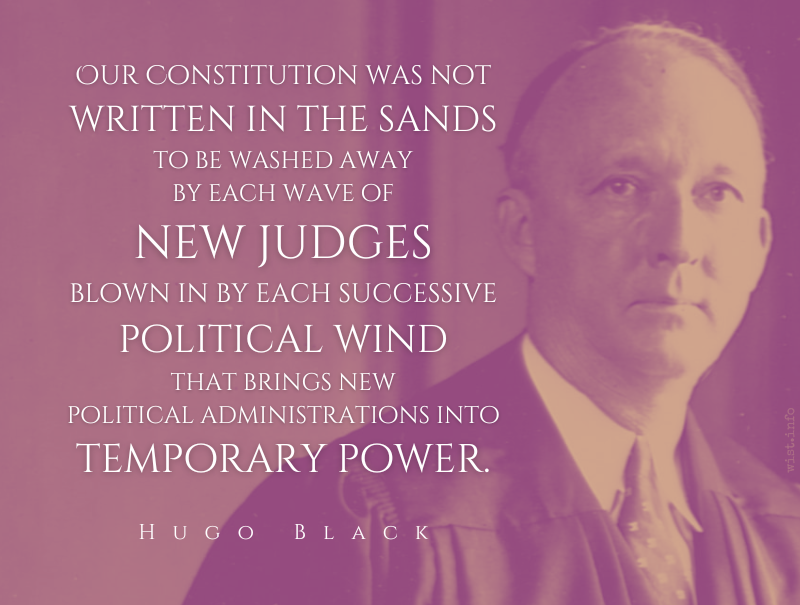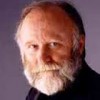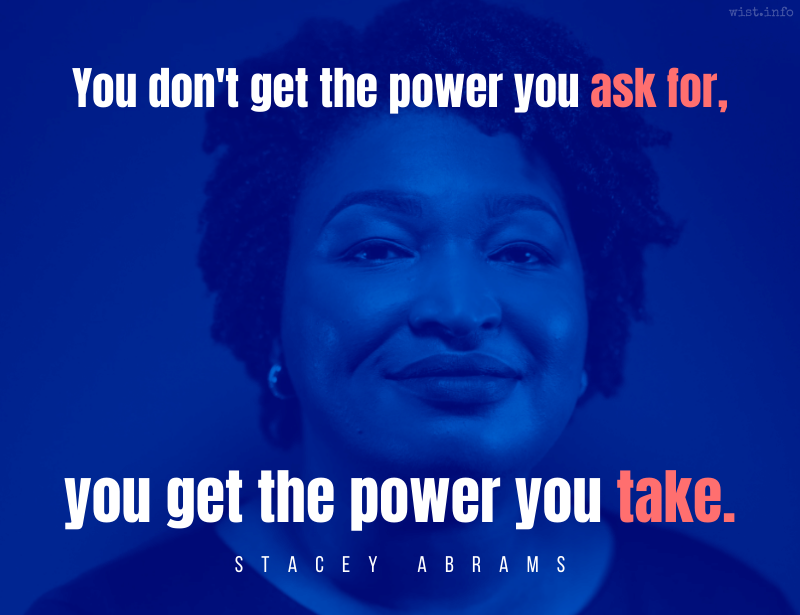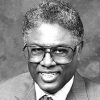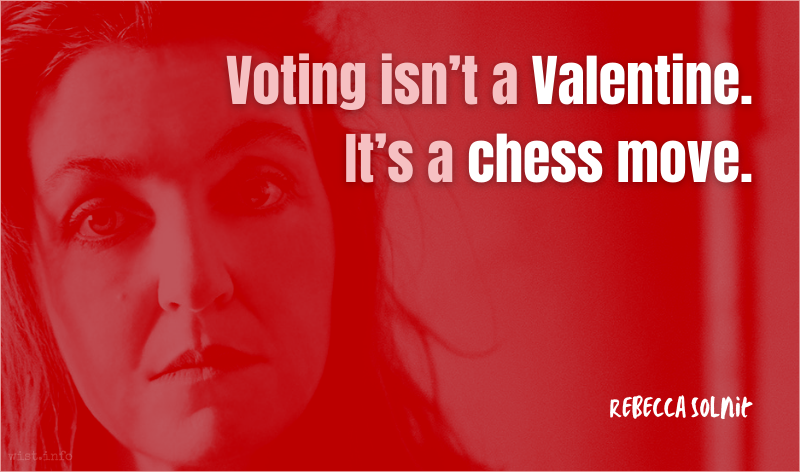In political institutions nearly everything that we now call an abuse, was once a remedy.
[Presque tout ce que nous appelons un abus fut un remède dans les institutions politiques.]
Joseph Joubert (1754-1824) French moralist, philosopher, essayist, poet
Pensées [Thoughts], ch. 18 “Du Siècle [On the Age],” ¶ 21 (1850 ed.) [tr. Lyttelton (1899), ch. 17, ¶ 8]
(Source)
(Source (French)). Alternate translation:
In political institutions, almost everything we call an abuse was once a remedy.
[tr. Auster (1983)], 1813 entry]
Quotations about:
politics
Note not all quotations have been tagged, so Search may find additional quotes on this topic.
It [political opposition] is like dancing with a bear. When you’re dancing with a bear, you can’t get tired and sit down. You have to wait for the bear to get tired.
Joycelyn Elders (b. 1933) American pediatrician, public health administrator, academic
Keynote Speech, Sistersong Conference, Chicago (2007-06-03)
(Source)
We are in this lifetime together. And maybe it’s possible to appreciate the other guy for the way his mind works, even when he’s not working your way.
Norman Lear (1922-2023) American television writer-producer
“What makes Norman Lear, at 98, still tick?”, interview by Jonathan LaPook, CBS News Sunday Morning (2021-01-10)
(Source)
There’s a great deal to be said for nationalism, for keeping diversity — in literature, in art, in language, and in all kinds of cultural things. But when it comes to politics, I think nationalism is an unmitigated evil. I don’t think there’s a single thing to be said in its favor.
Bertrand Russell (1872-1970) English mathematician and philosopher
Interview by Woodrow Wyatt, BBC TV (1959)
Collected in Bertrand Russell's BBC Interviews (1959) [UK] and Bertrand Russell Speaks His Mind (1960) [US]. Reprinted (abridged) in The Humanist (1982-11/12), and in Russell Society News, #37 (1983-02).
If all public questions were settled by shooting dice, fifty percent of them would be settled correctly. This would be five times as good a score as we make now.
H. L. Mencken (1880-1956) American writer and journalist [Henry Lewis Mencken]
A Little Book in C Major, ch. 3, § 19 (1916)
(Source)
As long as I was in Washington I never met anybody that I thought was good enough, who knew enough, or who loved enough to make sexual decisions for anybody else.
Joycelyn Elders (b. 1933) American pediatrician, public health administrator, academic
Penn & Teller: Bullshit!, s. 4, ep. 6 “Abstinence” (2006-06-05)
(Source)
Among the lessons taught by the French Revolution, there is none sadder or more striking than this — that you may make everything else out of the passions of men except a political system that will work, and that there is nothing so pitilessly and unconsciously cruel as sincerity formulated into dogma.
James Russell Lowell (1819-1891) American diplomat, essayist, poet
“Abraham Lincoln” (1864), My Study Windows (1871)
(Source)
A fanatical group all together have a comfortable feeling that they’re all friends with one another. They are all very much excited about the same thing. You can see it in any political party. There’s always a fringe of fanatics in any political party, and they feel very cozy with one another; and when that is spread about and is combined with a propensity to hate some other group, you get fanaticism well developed.
Bertrand Russell (1872-1970) English mathematician and philosopher
Interview by Woodrow Wyatt, BBC TV (1959)
(Source)
Collected in Bertrand Russell's BBC Interviews (1959) [UK] and Bertrand Russell Speaks His Mind (1960) [US]. Reprinted (abridged) in The Humanist (1982-11/12), and in Russell Society News, #37 (1983-02).
Historians may be dogmatists, I know, though not so often now as when history was dogma. At least you will perhaps agree that even a smattering of history and especially of letters will go far to dull the edges of uncompromising conviction. No doubt one may quote history to support any cause, as the devil quotes scripture; but modern history is not a very satisfactory side-arm in political polemics; it grows less and less so.
Learned Hand (1872-1961) American jurist
“Sources of Tolerance,” speech, University of Pennsylvania Law School (1930-06)
(Source)
Collected in The Spirit of Liberty (1953).
Others lash the unknown seas with oars,
Rush at the sword, pay court in royal halls.
One destroys a city and its homes
To drink from jewelled cups and sleep on scarlet;
One hoards his wealth and lies on buried gold.
One gapes dumbfounded at the speaker’s stand;
At the theater, still another, open-mouthed,
Reels before crescendos of applause
From the tiers where mob and dignitaries sit.
Others are keen to drench themselves in blood,
Their brothers’ blood, and, exiled, change their homes
And winsome hearths, to range abroad for room
To live in, underneath a foreign sun.[Sollicitant alii remis freta caeca ruuntque
in ferrum, penetrant aulas et limina regum;
hic petit excidiis urbem miserosque Penatis,
ut gemma bibat et Sarrano dormiat ostro;
condit opes alius defossoque incubat auro;
hic stupet attonitus rostris; hunc plausus hiantem
per cuneos — geminatus enim plebisque patrumque —
corripuit; gaudent perfusi sanguine fratrum,
exsilioque domos et dulcia limina mutant
atque alio patriam quaerunt sub sole iacentem.]Virgil (70-19 BC) Roman poet [b. Publius Vergilius Maro; also Vergil]
Georgics [Georgica], Book 2, l. 504ff (2.504-513) (29 BC) [tr. Bovie (1956)]
(Source)
Virgil contrasting violent, ambitious, vain, and rootless life of city folk (evoking the Roman civil wars), in contrast to the bucolic peace and sense of home enjoyed by farmers.
(Source (Latin)). Alternate translations:
Some vex the Sea, and some to war resorts,
Attend on Kings, and waite in Princes Courts.
This would his Countrey, and his God betray
To drink in Jems, and on proud scarlet lye.
This hides his wealth, and broods on hidden gold,
This loves to plead, and that to be extold
Through all the seats of Commons, and the sires.
To bathe in's brothers blood this man desires.
Some banish'd, must their native seats exchange,
And Countries, under other Climates range.
[tr. Ogilby (1649)]
Some to the Seas, and some to Camps resort,
And some with Impudence invade the Court.
In foreign Countries others seek Renown,
With Wars and Taxes others waste their own.
And Houses burn, and household Gods deface,
To drink in Bowls which glitt'ring Gems enchase:
To loll on Couches, rich with Cytron Steds,
And lay their guilty Limbs in Tyrian Beds.
This Wretch in Earth intombs his Golden Ore,
Hov'ring and brooding on his bury'd Store.
Some Patriot Fools to pop'lar Praise aspire,
By Publick Speeches, which worse Fools admire.
While from both Benches, with redoubl'd Sounds,
Th' Applause of Lords and Commoners abounds.
Some through Ambition, or thro' Thirst of Gold;
Have slain their Brothers, or their Country sold:
And leaving their sweet Homes, in Exile run
To Lands that lye beneath another Sun.
[tr. Dryden (1709), l. 720ff]
Some rush to battle, vex with oars the deep,
Or in the courts of Kings insidious creep;
For cups of gem, and quilts of Tyrian, die,
Others remorseless loose each public tie:
On hoarded treasures these ecstatic gaze,
Those eye the Rostra, stupid with amaze:
This for the theatre's applauding roar
Sighs: with the blood of brothers sprinkled o'er
From their dear homes to exile others run,
And seek new seats beneath a distant sun.
[tr. Nevile (1767), l. 565ff]
Some vex with restless oar wild seas unknown.
Some rush on death, or cringe around the throne;
Stern warriors here beneath their footsteps tread
The realm that rear'd them, and the hearth that fed,
To quaff from gems, and lull to transient rest
The wound that bleeds beneath the Tyrian vest.
These brood with sleepless gaze o'er buried gold,
The rostrum these with raptur'd trance behold,
Or wonder when repeated plaudits raise
'Mid peopled theatres the shout of praise;
These with grim joy, by civil discord led,
And stain'd in battles where a brother bled.
From their sweet household hearth in exile roam,
And seek beneath new suns a foreign home.
[tr. Sotheby (1800)]
Some vex the dangerous seas with oars, some rush into arms, some work their way into courts, and the palaces of kings. One destines a city and wretched families to destruction, that he may drink in gems and sleep on Tyrian purple. Another hoards up wealth, and broods over buried gold. One, astonished at the rostrum, grows giddy; another peals of applause along the rows, (for it is redoubled both by the people and the fathers,) have captivated, and set agape; some rejoice when stained with their brother's blood; and exchange their homes and sweet thresholds for exile, and seek a country lying under another sun.
[tr. Davidson (1854)]
While others vex dark Hellespont with oars,
Leap on the sword, or dash through royal stores,
Storm towns and homesteads, in their vile desire
To quaff from pearl, and sleep on tints of Tyre;
While others hoard and brood on buried dross,
And some are moonstruck at the pleader's gloss;
While this man gapes along the pit, to hear
The mob and senators renew their cheer;
And others, reeking in fraternal gore,
With songs of triumph quit their native shore,
Abjure sweet home for banishment, and run
In quest of country 'neath another sun --
[tr. Blackmore (1871), l. 602ff]
Others are startling the darkness of the deep with oars, rushing on the sword's pint, winning their way into the courts and ante-chambers of kings; another is dooming a city to ruin and its homes to misery, that he may drink from jewelled cups and sleep on Tyrian purple; another hoards his wealth, and broods o'er buried gold; this man is dazzled and amazed by the eloquence of the rostra; that man the applause of commoners and senators, as it rolls redoubled through the benches, transports agape with wonder; they steep their hands in brothers' blood and joy, they change their homes and the thresholds of affection for the land of exile, and seek a fatherland that lies beneath another sun.
[tr. Wilkins (1873)]
Others vex
The darksome gulfs of Ocean with their oars,
Or rush on steel: they press within the courts
And doors of princes; one with havoc falls
Upon a city and its hapless hearths,
From gems to drink, on Tyrian rugs to lie;
This hoards his wealth and broods o'er buried gold;
One at the rostra stares in blank amaze;
One gaping sits transported by the cheers,
The answering cheers of plebs and senate rolled
Along the benches: bathed in brothers' blood
Men revel, and, all delights of hearth and home
For exile changing, a new country seek
Beneath an alien sun.
[tr. Rhoades (1881)]
These dare the ocean, and invite the storm,
This rage, and this the courtier’s wiles deform;
All faith, all right the traitor’s acts defy,
From gems to drink, on Tyrian purple lie;
One broods in misery o’er his hoarded gold.
And one in chains the people’s plaudits hold.
There stains of blood pollute a brother’s hand,
And he in terror flies his father’s land.
[tr. King (1882), l. 514ff]
Some vex the dangerous seas with oars, or rush into arms, or work their way into courts and the palaces of kings: one marks out a city and its wretched homes for destruction, that he may drink from jewelled cups and sleep on Tyrian purple. Another hoards up wealth, and lies sleepless on his buried gold. One, in bewildered amazement, gazes at the Rostra; another, in open-mouthed delight, the plaudits of the commons and the nobles, redoubled along benches, have arrested: some take pleasure in being drenched with a brother’s blood; and exchange their homes and dear thresholds for exile, and seek a country lying under another sun.
[tr. Bryce (1897)]
Others vex blind sea-ways with their oars, or rush upon the sword, pierce the courts and chambers of kings; one aims destruction at the city and her wretched homes, that he may drink from gems and sleep on Tyrian scarlet; another heaps up wealth and broods over buried gold; one hangs rapt in amaze before the Rostra; one the applause of populace and senate re-echoing again over the theatre carries open-mouthed away: joyfully they steep themselves in blood of their brethren, and exchange for exile the dear thresholds of their homes, and seek a country spread under an alien sun.
[tr. Mackail (1899)]
Others may tempt with oars the printless sea, may fling
Their lives to the sword, may press through portals and halls of a king.
This traitor hath ruined his country, hath blasted her homes, thereby
To drink from a jewelled chalice, on Orient purple to lie;
That fool hoards up his wealth, and broods o'er his buried gold;
That simple-one gazes rapt on the rostra: the loud cheers rolled
Down the theatre-seats, as Fathers and people acclaiming stood,
Have entranced yon man; men drench them with joy in their brethren's blood;
Into exile from home and its sweet, sweet threshold some have gone
Seeking a country that lieth beneath an alien sun.
[tr. Way (1912), l. 503ff]
Let strangers to such peace
Trouble with oars the boundless seas or fly
To wars, and plunder palaces of kings;
Make desolate whole cities, casting down
Their harmless gods and altars, that one's wine
May from carved rubies gush, and slumbering head
On Tyrian pillow lie. A man here hoards
His riches, dreaming of his buried gold;
Another on the rostrum's flattered pride
Stares awe-struck. Him th' applause of multitudes.
People and senators, when echoed shouts
Ring through the house approving, quite enslaves.
With civil slaughter and fraternal blood
One day such reek exultant, on the next
Lose evermore the long-loved hearth and home.
[tr. Williams (1915)]
Others brave with oars seas unknown, dash upon the sword, or press their way into courts and the chambers of kings. One wreaks ruin on a city and its wretched homes, and all to drink from a jewelled cup and sleep on Tyrian purple; another hoards wealth and gloats over buried gold; one stares in admiration at the rostra; another, open-mouthed, is carried away by the applause of high and low which rolls again and again along the benches. They steep themselves in their brothers’ blood and glory in it; they barter their sweet homes and hearths for exile and seek a country that lies beneath an alien sun.
[tr. Fairclough (Loeb) (1916)]
Other men dare the sea with their oars blindly, or dash
On the sword, or insinuate themselves into royal courts:
One ruins a whole town and the tenements of the poor
In his lust for jewelled cups, for scarlet linen to sleep on,
One piles up great wealth, gloats over his cache of gold;
One gawps at the public speakers; one is worked up to hysteria
By the plaudits of senate and people resounding across the benches:
These shed their brothers’ blood
Merrily, they barter for exile their homes beloved
And leave for countries lying under an alien sun.
[tr. Day-Lewis (1940)]
Others churn blind straits with their oars, and rush to the sword, force their way across the thresholds and into the courts of kings; [...] They rejoice, soaked in their brothers’ blood, exchange their own sweet thresholds for exile and seek a fatherland under another sun.
[tr. Miles (1980)]
Some vex with oars uncharted waters, some
Rush on cold steel, some seek to worm their way
Into the courts of kings. One is prepared
To plunge a city's homes in misery
All for a jewelled cup and a crimson bedspread;
Another broods on a buried hoard of gold.
This one is awestruck by the platform's thunder;
That one, enraptured, gapes ad the waves of applause
from high and low rolling across the theater.
Men revel steeped in brothers' blood, exchange
The hearth they love for banishment, and seek
A home in lands benath an alien sun.
[tr. Wilkinson (1982)]
Others trouble unknown seas with oars, rush on
their swords, enter the gates and courts of kings.
This man destroys a city and its wretched houses,
to drink from a jewelled cup, and sleep on Tyrian purple:
that one heaps up wealth, and broods about buried gold:
one’s stupefied, astonished by the Rostra: another, gapes,
entranced by repeated applause, from people and princes,
along the benches: men delight in steeping themselves
in their brothers’ blood, changing sweet home and hearth for exile,
and seeking a country that lies under an alien sun.
[tr. Kline (2001)]
Others slap their oars on dark, unknown seas, fall on their swords,
or thrust themselves into royal courts and palaces.
One man aims to destroy a city and its humble homes -- just
to drink from a jeweled goblet and sleep on Tyrian purple;
another stores up treasures and broods on his buried gold.
Wide-eyed, one gawks at the forum's speakers; another,
mouth agape, is swept away when lower class and upper both
applaud a statesman. Dripping with their brothers' gore,
they exult, exchanging familiar homes and hearths for exile,
they seek a fatherland that lies beneath a foreign sun.
[tr. Lembke (2004)]
Others fret with oars uncharted seas, or rush
upon the sword, or infiltrate the courts and vestibules of kings.
One visits devastation on a city and its wretched hearths
that he may slurp from a jewelled cup and snore on Tyrian purple.
Another hoards treasure and broods over buried gold.
One wonders thunderstruck at the podium, one gapes
transported by the applause of senators and commonfolk
resounding through the galleries. Drenched in their brothers' blood
they exult, and trade exile for their homes and sweet porches,
and seek a homeland under an alien sun.
[tr. Johnson (2009)]
There are those who with their oars disturb the waters
Of dangerous unknown seas, and those who rush
Against the sword, and those who insinuate
Their way into the chamber of a king:
There's one who brings down ruin on a city
And all its wretched households, in his desire
To drink from an ornate cup and go to sleep
On Tyrian purple coverlets at night;
There's the man who heaps up gold, and hides it away,
There's he who stares up stupefied at the Rostrum;
There's the open-mouthed, undone astonishment
Of the one who hears the waves and waves of the wild
Applause of the close packed crowd in the theater;
There are those who bathe in their brothers' blood, rejoicing;
And those who give up house and home for exile,
Seeking a land an alien sun shines on.
[tr. Ferry (2015)]
I never diskuss politiks nor sektarianism; i beleave in letting every man fight hiz rooster hiz own way.
[I never discuss politics nor [religious] sectarianism; I believe in letting every man fight his rooster his own way.]Josh Billings (1818-1885) American humorist, aphorist [pseud. of Henry Wheeler Shaw]
Everybody’s Friend, Or; Josh Billing’s Encyclopedia and Proverbial Philosophy of Wit and Humor, ch. 131 “Affurisms: Plum Pits (1)” (1874)
(Source)
History. We want to find moral lessons in it, but its only lessons are of politics, military art, etc.
Joseph Joubert (1754-1824) French moralist, philosopher, essayist, poet
Pensées [Thoughts], 1806 [tr. Auster (1983)]
(Source)
I have been unable to find an analog in other translations, or in the original French.
The whole trouble with the Republicans is their fear of an increase in income tax, especially on higher incomes. They speak of it almost like a national calamity. I really believe if it come to a vote whether to go to war with England, France and Germany combined, or raise the rate on incomes of over $100,000, they would vote war.
You can’t beat an Administration by attacking it. You have to show some plan of improving on it.
Legitimacy is based on three things. First of all, the people who are asked to obey authority have to feel like they have a voice — that if they speak up, they will be heard. Second, the law has to be predictable. There has to be a reasonable expectation that the rules tomorrow are going to be roughly the same as the rules today. And third, the authority has to be fair. It can’t treat one group differently from another.
Malcolm Gladwell (b. 1963) Anglo-Canadian journalist, author, public speaker
David and Goliath: Underdogs, Misfits, and the Art of Battling Giants (2013)
(Source)
Well, you know how Congress is. They’ll vote for anything if the thing they vote for will turn around and vote for them.
Reality has a well-known liberal bias.
FIRST OFFICER: That’s a brave fellow, but he’s vengeance proud and loves not the common people.
SECOND OFFICER: ’Faith, there hath been many great men that have flattered the people who ne’er loved them; and there be many that they have loved they know not wherefore; so that, if they love they know not why, they hate upon no better a ground. Therefore, for Coriolanus neither to care whether they love or hate him manifests the true knowledge he has in their disposition and, out of his noble carelessness, lets them plainly see ’t.
William Shakespeare (1564-1616) English dramatist and poet
Coriolanus, Act 2, sc. 2, l. 5ff (2.2.5-15) (c. 1608)
(Source)
The truth is often painful and disturbing. Hence if you stick to unalloyed reality, few people will follow you. An American presidential candidate who tells the American public the truth, the whole truth and nothing but the truth about American history has a 100 percent guarantee of losing the elections. The same goes for candidates in all other countries. How many Israelis, Italians or Indians can stomach the unblemished truth about their nations? An uncompromising adherence to the truth is an admirable spiritual practice, but it is not a winning political strategy.
Yuval Noah Harari (b. 1976) Israeli public intellectual, historian, academic, writer [יובל נח הררי]
“Why Fiction Trumps Truth,” New York Times (24 May 2019)
(Source)
I told him to preach the Gospel. That’s our calling. I want to preserve the purity of the Gospel and the freedom of religion in America. I don’t want to see religious bigotry in any form. Liberals organized in the ’60s, and conservatives certainly have a right to organize in the ’80s, but it would disturb me if there was a wedding between the religious fundamentalists and the political right. The hard right has no interest in religion except to manipulate it.
Billy Graham (1918-2018) American evangelist, revivalist, author [William Franklin Graham Jr.]
“Billy Graham: America Is Not God’s Only Kingdom,” Parade Magazine (1 Feb 1981)
(Source)
A comment Graham said he gave to Jerry Falwell, head of the Moral Majority. Usually quoted in an abbreviated version:
I don't want to see religious bigotry in any form. It would disturb me if there was a wedding between religious fundamentalists and the political right. The hard right has no interest in religion except to manipulate it.
It is this right, the right to err politically, which keeps us strong as a Nation. For no number of laws against communism can have as much effect as the personal conviction which comes from having heard its arguments and rejected them, or from having once accepted its tenets and later recognized their worthlessness.
Hugo Black (1886-1971) American politician and jurist, US Supreme Court Justice (1937-71)
Barenblatt v. United States, 360 U.S. 109, 144 (1959) [dissent]
(Source)
The problem of censorship in television is not only a writer’s problem. What narrows his frame of reference must of necessity narrow the area of television entertainment available to the audience. When the television drama is forced to go around Robin Hood’s barn tying itself into verbal knots to evolve as stainlessly nonpartisan, whatever nonsense comes out as the replacement is the nonsense that an audience must live with on its television sets. Perhaps if some thoughtful people would write to sponsors, pleading for an adult airing of issues on a dramatic program, to counteract those cranks who hoist up the Stars and Bars whenever a play suggests a racial controversy, the sponsor or agency would realize that not to attack a controversial theme might be just as destructive as attacking it.
Rod Serling (1924-1975) American screenwriter, playwright, television producer, narrator
Patterns, Introduction (1957)
(Source)
Democracy has no place for the kind of justice implied in an eye for an eye and a tooth for a tooth. Democracy is a system for the resolution of conflict, not for vengeance. Simple black-white notions of right and wrong do not fit into democratic politics. Political controversies result from the fact that the issues are complex, and men may properly have differences of opinion about them. The most terrible of all over-simplifications is the notion that politics is a contest between good people and bad people.
E. E. Schattschneider (1892-1971) American political scientist [Elmer Eric Schattschneider]
Two Hundred Million Americans in Search of a Government (1969)
(Source)
When citizens are relatively equal, politics has tended to be fairly democratic. When a few individuals hold enormous amounts of wealth, democracy suffers. The reason for this pattern is simple. Through campaign contributions, lobbying, influence over public discourse, and other means, wealth can be translated into political power. When wealth is highly concentrated — that is, when a few individuals have enormous amounts of money — political power tends to be highly concentrated, too. The wealthy few tend to rule. Average citizens lose political power. Democracy declines.
Benjamin I. Page (b. 1940) American political scientist, academic, researcher
Democracy in America?: What Has Gone Wrong and What We Can Do About It, Part 1, ch. 2 (2017) [with Martin Gilens]
(Source)
Fascist politics includes many distinct strategies: the mythic past, propaganda, anti-intellectualism, unreality, hierarchy, victimhood, law and order, sexual anxiety, appeals to the heartland, and a dismantling of public welfare and unity.
Jason Stanley (b. 1969) American philosopher, epistemologist, academic
How Fascism Works: The Politics of Us and Them, Introduction (2018)
(Source)
What happens when conspiracy theories become the coin of politics, and mainstream media and educational institutions are discredited, is that citizens no longer have a common reality that can serve as background for democratic deliberation. In such a situation, citizens have no choice but to look for markers to follow other than truth or reliability. What happens in such cases, as we see across the world, is that citizens look to politics for tribal identifications, for addressing personal grievances, and for entertainment. When news becomes sports, the strongman achieves a certain measure of popularity. Fascist politics transforms the news from a conduit of information and reasoned debate into a spectacle with the strongman as the star.
Jason Stanley (b. 1969) American philosopher, epistemologist, academic
How Fascism Works: The Politics of Us and Them, ch. 4 (2018)
(Source)
Our Constitution was not written in the sands to be washed away by each wave of new judges blown in by each successive political wind that brings new political administrations into temporary power.
Hugo Black (1886-1971) American politician and jurist, US Supreme Court Justice (1937-71)
Turner v. United States, 396 U.S. 398, 426 (1970) [dissenting]
(Source)
It’s the problem with politics. Your enemies are often your allies. And vice versa.
Daniel Abraham (b. 1969) American writer [pseud. James S. A. Corey (with Ty Franck), M. L. N. Hanover]
Leviathan Wakes, ch. 19 (2011) [with Ty Franck]
(Source)
When religion and politics travel in the same cart, the riders believe nothing can stand in their way. Their movements become headlong — faster and faster and faster. They put aside all thoughts of obstacles and forget the precipice does not show itself to the man in a blind rush until it’s too late.
Frank Herbert (1920-1986) American writer
Dune, Book 3 “The Prophet” (1965)
(Source)
Jessica, quoting a Bene Gesserit proverb.
In Appendix 2, there is reference to another Bene Gesserit teaching: "When religion and politics ride the same cart, when that cart is driven by a living holy man (baraka), nothing can stand in their path."
We are never going to have someone who’s perfect [for President]. We have to change our system so that it can operate with flawed people.
Politics: a Trojan horse race.
Stanislaw Lec (1909-1966) Polish aphorist, poet, satirist
More Unkempt Thoughts [Myśli nieuczesane nowe] (1964) [tr. Gałązka (1969)]
(Source)
One of the things he deplored about the loss of religion, it meant that people elevated politics into a religious faith and that was dangerous.
P. D. James (1920-2014) British mystery writer [Phyllis Dorothy James White]
“Mortal Consequences,” A Taste for Death (1986)
(Source)
There are many people who can exercise virtue in their own affairs, but are unable to do so in their relations with others. This is why the aphorism of Bias, “Office will reveal the man”, seems a good one, since an official is, by virtue of his position, engaged with other people and the community at large.
[πολλοὶ γὰρ ἐν μὲν τοῖς οἰκείοις τῇ ἀρετῇ δύνανται χρῆσθαι, ἐν δὲ τοῖς πρὸς ἕτερον ἀδυνατοῦσιν. καὶ διὰ τοῦτο εὖ δοκεῖ ἔχειν τὸ τοῦ Βίαντος, ὅτι ἀρχὴ ἄνδρα δείξει: πρὸς ἕτερον γὰρ καὶ ἐν κοινωνίᾳ ἤδη ὁ ἄρχων.]
Aristotle (384-322 BC) Greek philosopher
Nicomachean Ethics [Ἠθικὰ Νικομάχεια], Book 5, ch. 1 (5.1.15-16) / 1129b.33ff (c. 325 BC) [tr. Crisp (2000)]
(Source)
(Source (Greek)). Alternate translations:
I mean, there are many who can practise virtue in the regulation of their own personal conduct who are wholly unable to do it in transactions with their neighbour. And for this reason that saying of Bias is thought to be a good one, “Rule will show what a man is;” for he who bears Rule is necessarily in contact with others, i.e., in a community.
[tr. Chase (1847), ch. 2]
For many there be who can make good use of their virtue in their own matters, but not towards their fellow-man. And, hence, Bias would seem to have said well, saying that, "It is authority that shows the man." For whosoever is in authority stands ipso facto in relation to his fellow-man, in that he is a fellow-member of the body politic.
[tr. Williams (1869)]
For there are many people who are capable of exhibiting virtue at home, but incapable of exhibiting it in relation to their neighbors. Accordingly there seems to be good sense in saying of Bias that "office will reveal a man," for one who is in office is at once brought into relation and association with others.
[tr. Welldon (1892)]
For there are many who can be virtuous enough at home, but fail in dealing with their neighbours. This is the reason why people commend the saying of Bias, “Office will show the man;” for he that is in office ipso facto stands in relation to others, and has dealings with them.
[tr. Peters (1893)]
For many men can exercise virtue in their own affairs, but not in their relations to their neighbour. This is why the saying of Bias is thought to be true, that "rule will show the man"; for a ruler is necessarily in relation to other men and a member of a society.
[tr. Ross (1908)]
For there are many who can practise virtue in their own private affairs but cannot do so in their relations with another. This is why we approve the saying of Bias, "Office will show a man"; for in office one is brought into relation with others and becomes a member of a community.
[tr. Rackham (1934)]
For many people are able to use their virtue in what properly belongs to themselves, but unable to do so in issues relating to another person. And this is why Bias' saying, "ruling office shows forth the man," seems good, since a ruler is automatically in relation to another person and in a community with him.
[tr. Reeve (1948)]
I say this because there are plenty of people who can behave uprightly in their own affairs, but are incapable of doing so in relation to somebody else. That is why Bias's saying "Office will reveal the man" is felt to be valid; because an official is eo ipso in relation to, and associated with, somebody else.
[tr. Thomson/Tredennick (1976)]
For many people are able to use virtue in dealing with the members of their household, but in their affairs together regarding another, they are unable to do so. And on this account, the saying of Bias seems good, that "office will show the man." For he who rules is already in relation to another and within the community.
[tr. Bartlett/Collins (2011)]
If you are bored and disgusted by politics and don’t bother to vote, you are in effect voting for the entrenched Establishments of the two major parties, who please rest assured are not dumb, and who are keenly aware that it is in their interests to keep you disgusted and bored and cynical and to give you every possible psychological reason to stay at home doing one-hitters and watching MTV on primary day. By all means stay home if you want, but don’t bullshit yourself that you’re not voting. In reality, there is no such thing as not voting: you either vote by voting, or you vote by staying home and tacitly doubling the value of some Diehard’s vote.
Of course, when stood next to the choice of American political parties (“So, would you like Right Wing, or Supersized Right Wing with Extra Fries?”) my English fuzzy middle-of-the-roadness probably translates easily as bomb-throwing Trotskyist, but when I get to chat to proper lefties like Ken MacLeod or China Mieville I feel myself retreating rapidly back into the woffly Guardian-reading why-can’t-people-just-be-nice-to-each-otherhood of the politically out of his depth.
Neil Gaiman (b. 1960) British author, screenwriter, fabulist
Blog entry (2003-06-15), “Walking Down the Street Naked, Possibly with a Mullet”
(Source)
When asked whether (and denying) he is a Communist.
I think one must continue the political struggle, just as a doctor must try to save the life of a patient who is probably going to die. But I do suggest that we shall get nowhere unless we start by recognizing that political behaviour is largely non-rational, that the world is suffering from some kind of mental disease which must be diagnosed before it can be cured.
George Orwell (1903-1950) English writer [pseud. of Eric Arthur Blair]
“As I Please” column, Tribune (1946-11-29)
(Source)
Variant: "Politics is mostly non-rational; the world is suffering from some kind of mental disorder which must be diagnosed before it can be cured."
All citizens do have a measure of control, at least in democracies where their votes are counted, of how they belong to their nations. Perhaps they will have more confidence in unconventional choices if they see that each nation’s founders were disobedient and unpredictable, men and women of imagination and ambition. The steel of every national monument was once molten.
Timothy Snyder (b. 1969) American historian, author
The Red Prince, “Orange: European Revolutions” (2008)
(Source)
Life is political, not because the world cares about how you feel, but because the world reacts to what you do.
Timothy Snyder (b. 1969) American historian, author
On Tyranny: Twenty Lessons from the Twentieth Century (2017)
(Source)
You don’t get the power you ask for, you get the power you take.
If political loyalty is signaled by believing a true story, anyone can fake it. But believing ridiculous and outlandish stories exacts greater cost, and is therefore a better signal of loyalty. If you believe your leader only when he or she tells the truth, what does that prove? In contrast, if you believe your leader even when he or she builds castles in the air, that’s loyalty! Shrewd leaders might sometimes deliberately say nonsensical things as a way to distinguish reliable devotees from fair-weather supporters.
Yuval Noah Harari (b. 1976) Israeli public intellectual, historian, academic, writer [יובל נח הררי]
“Why Fiction Trumps Truth,” New York Times (24 May 2019)
(Source)
I think one must engage in politics — using the word in a wide sense — and that one must have preferences: that is, one must recognise that some causes are objectively better than others, even if they are advanced by equally bad means. As for the nationalistic loves and hatreds that I have spoken of, they are part of the make-up of most of us, whether we like it or not. Whether it is possible to get rid of them I do not know, but I do believe that it is possible to struggle against them, and that this is essentially a moral effort. It is a question first of all of discovering what one really is, what one’s own feelings really are, and then of making allowance for the inevitable bias.
George Orwell (1903-1950) English writer [pseud. of Eric Arthur Blair]
“Notes on Nationalism” (May 1945)
(Source)
History is thought of largely in nationalist terms, and such things as the Inquisition, the tortures of the Star Chamber, the exploits of the English buccaneers (Sir Francis Drake, for instance, who was given to sinking Spanish prisoners alive), the Reign of Terror, the heroes of the Mutiny blowing hundreds of Indians from the guns, or Cromwell’s soldiers slashing Irishwomen’s faces with razors, become morally neutral or even meritorious when it is felt that they were done in the “right” cause. If one looks back over the past quarter of a century, one finds that there was hardly a single year when atrocity stories were not being reported from some part of the world; and yet in not one single case were these atrocities — in Spain, Russia, China, Hungary, Mexico, Amritsar, Smyrna — believed in and disapproved of by the English intelligentsia as a whole. Whether such deeds were reprehensible, or even whether they happened, was always decided according to political predilection.
George Orwell (1903-1950) English writer [pseud. of Eric Arthur Blair]
“Notes on Nationalism” (May 1945)
(Source)
After any disturbance (such as two world wars coinciding with a period of growing economic and monetary incomprehensibility) we find our old concepts inadequate and look for new ones. But it unfortunately happens that the troubled times which produce an appetite for new ideas are the least propitious for clear thinking.
Rebecca West (1892-1983) British author, journalist, literary critic, travel writer [pseud. for Cicily Isabel Fairfield]
In The Sunday Telegraph, London (1981)
(Source)
The central conservative truth is that it is culture, not politics, that determines the success of a society. The central liberal truth is that politics can change a culture and save it from itself.
Daniel Patrick Moynihan (1927-2003) American politician, diplomat, sociologist
Godkin Lecture, Harvard (1985)
(Source)
As reprinted in his book, Family and Nation (1986).
Now, that man is more of a political animal than bees or any other gregarious animals is evident. Nature, as we often say, makes nothing in vain, and man is the only animal whom she has endowed with the gift of speech.
[διότι δὲ πολιτικὸν ὁ ἄνθρωπος ζῷον πάσης μελίττης καὶ παντὸς ἀγελαίου ζῴου μᾶλλον, δῆλον. οὐθὲν γάρ, ὡς φαμέν, μάτην ἡ φύσις ποιεῖ·]
Aristotle (384-322 BC) Greek philosopher
Politics [Πολιτικά], Book 1, ch. 2, sec. 10 / 1253a.7-11 [tr. Jowett (1885)]
(Source)
Original Greek. Alternate translations:
- "And that man is a social animal in a fuller sense than any bee or gregarious animal is evident; for nature, we say, makes nothing without an object, and man is the only animal that possesses rational speech." [tr. Bolland (1877)]
- "The gift of speech also evidently proves that man is a more social animal than the bees, or any of the herding cattle: for nature, as we say, does nothing in vain, and man is the only animal who enjoys it." [tr. Ellis (1912)]
- "And why man is a political animal in a greater measure than any bee or any gregarious animal is clear. For nature, as we declare, does nothing without purpose; and man alone of the animals possesses speech." [tr. Rackham (1932)]
- "That man is much more a political animal than any kind of bee or any herd animal is clear. For, as we assert, nature does nothing in vain; and man alone among the animals has speech." [tr. Lord (1984)]
- "It is also clear why a human is more of a political animal than any bee or any other gregarious animal. For nature does nothing pointlessly, as we say, and a human being alone among the animals has speech." [tr. Reeve (2007)]
- "It is clear that man is a political animal, more than every bee and herd animal: for nature makes nothing in vain and man alone of living things has reason." [tr. @sentantiq (2011)]
Our political system has been thoroughly corrupted, and by the usual suspect — money, what else? The corruption is open, obscene, and unmistakable. The way campaigns are financed is a system of legalized bribery. We have a government of special interests, by special interests, and for special interests. And that will not change until we change the way campaigns are financed.
Molly Ivins (1944-2007) American writer, political columnist [Mary Tyler Ivins]
You Got to Dance With Them What Brung You, Introduction (1998)
(Source)
I’ve always said that in politics, your enemies can’t hurt you, but your friends will kill you.
Ann Richards (1933-2006) American politician [Dorothy Ann Willis Richards]
“Sadder but Wiser,” interview with Paul Burka, Texas Monthly (Apr 1994)
(Source)
Referring to appointees whose failures had caused her political problems as governor.
I would rather be defeated than make capital out of my religion.
James A. Garfield (1831-1881) US President (1881), lawyer, lay preacher, educator
Speech, Chatauqua (1 Apr 1880)
(Source)
In politics as on the sickbed, people toss from one side to the other, fancying that they will be more comfortable.
Johann Wolfgang von Goethe (1749-1832) German poet, statesman, scientist
Conversation with Friedrich von Müller (29 Dec 1825)
(Source)
In Biedermann, Goethes Gespräche, Gesamtausgabe, #2379 (1909). Usual variant: "In politics, as on the sickbed, people toss from one side to the other, thinking they will be more comfortable."
The first lesson of economics is scarcity: there is never enough of anything to fully satisfy all those who want it. The first lesson of politics is to disregard the first lesson of economics.
Thomas Sowell (b. 1930) American economist and political commentator
“Student Loans,” Is Reality Optional? (1993)
(Source)
[The right wing] believe that their prestige in the community, even indeed their self-esteem, depends on having these values honored in public. Besides their economic expectations, people have deep emotional commitments in other spheres — religion, morals, culture, race relations — which they also hope to see realized in political action. Status politics seeks not to advance perceived material interests but to express grievances and resentments about such matters, to press claims upon society to give deference to non-economic values.
Douglas R. Hofstadter (b. 1945) American academic, cognitive scientist, author
“Pseudo-Conservatism Revisited — 1965,” sec. 4 (1965)
(Source)
Political strategies and tactics are not jealous lovers. You don’t have to be monogamous. Direct Action will not feel betrayed if you also vote from time to time — you can be poly in your tactics. And I am. Of course I vote! If you’re a woman, or a person of color, or a person who doesn’t own property, or even a white male who doesn’t belong to the nobility, centuries of struggle and many deaths have bought you the right to vote. I vote to keep faith with peasant rebels and suffragist hunger strikers and civil rights workers braving the lynch mobs of the South, if for no other reason. But there is another reason — because who we vote for has an enormous impact on real peoples’ lives.
Starhawk (b. 1951) American writer, activist, feminist theologian [b. Miriam Simos]
“Pre-Election Day Thoughts,” blog post (7 Nov 2016)
(Source)
Build movements. Vote with your values, but vote strategically. Voting isn’t a Valentine. It’s a chess move.
Rebecca Solnit (b. 1961) American writer, historian, activist
Facebook (17 Oct 2016)
(Source)
Solnit is credited with the core message of the last two sentences. She indicates (including from that Facebook post) that it was something she had said that was extracted and perhaps tweaked by May Boeve. E.g., "That 2016 aphorism that I sort of said and May Boeve made into this stand-alone slogan." (1 Nov 2018) "I said that off the cuff in 2016 and May Boeve caught it and it went on to have a nice life. It's also not the only chess move you get." (11 Aug 2020).
Variants:
- "Voting is a chess move, not a valentine. And here's the joy of being politically engaged all year round every year; you get to work with a whole lot of chess pieces and players and strategies and long-term visions, so you don't agonize over whether this little hop with a pawn we call voting defines you. You get to define yourself by what you're passionately committed to, by who you align with, by your dreams and your visions, you get to move a lot of pieces a lot of times, you get heroic allies, and you play to win above, beyond, around elections. But you vote, because you know it matters too." (7 Nov 2016)
- "I think of voting as a chess move, not a valentine. It’s just a little part of the picture of how we make the world." ("The 2000 Election Unleashed Disaster on the World. We Can’t Let that Happen Again in 2016," The Nation (3 Nov 2016))
- "A vote is not a valentine. You are not confessing your love for the candidate. It's a chess move for the world you want to live in."
- "Voting isn't a valentine, it's a chess move. Just one of many with one of your many pieces, if you're using what you've been given."
I can only say that politics, like misery, “bring a man acquainted with strange bedfellows.”
William Gifford (1756-1826) English critic, editor, poet, satirist
The Baviad, and Mæviad (1797)
(Source)
First recorded connection between Shakespeare's quote on misery and politics, leading to the eventual "Politics makes for strange bedfellows."
The art of leadership is a serious matter. One must not lag behind a movement, because to do so is to become isolated from the masses. But one must not rush ahead, for to rush ahead is to lose contact with the masses. He who wishes to lead a movement and at the same time keep touch with the vast masses, must conduct a fight on two fronts, against those who lag behind and against those who rush ahead.
Josef Stalin (1879-1953) Georgian revolutionary and Soviet dictator
Leninism, Vol. 2 (1926) [tr. Paul (1933)]
(Source)
Often elided, "He who wishes to lead a movement must conduct a fight on two fronts, against those who lag behind and against those who rush ahead."



